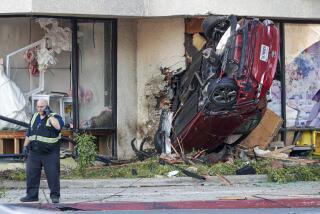A Father’s Grief Led to Proposed New Air Bags
- Share via
WASHINGTON — It should have been a forgettable, low-speed fender-bender. Instead, Robert Sanders carried his dying daughter from the minivan he had been driving when an air bag slammed her unconscious.
Today, thanks in no small measure to Sanders’ dogged, painful crusade to prevent such tragedies from happening to others, the Transportation Department plans to announce a rule designed to ensure that air bags are safe for children as well as full-size adults.
Current federal rules require only that air bags protect belted and unbelted crash test dummies in head-on, 30-mph crashes into an immovable barrier.
But air bags powerful enough to do that can be deadly to small bodies. As of Aug. 1, 65 children had been killed by air bags, almost all in accidents that would otherwise not have been fatal.
The proposed rule to be unveiled today would require air bags to pass safety tests using crash dummies of all sizes--large adult, small adult, child and infant.
It will be open to public comment for 90 days and may be modified before it takes effect. Lobbyists for the auto makers complain that the tests will be the most complicated ever required by the National Highway Traffic Safety Administration.
Sanders believes that many of the 65 children killed by air bags would be alive today if the rule had been in effect. A quietly intense man of 48 who was once a business lawyer, he keeps many of their pictures in his office. His daughter, Alison, is among them.
She was 7 when her father, tuning the radio, failed to stop in time for a red light and slid into another van. Their vehicle was traveling less than 10 mph. It had been Alison’s turn to sit in the front seat. Her two brothers, in the back, were unhurt.
Sanders, who went on to organize Parents for Safer Air Bags, is living proof that no matter how remote the federal government seems, ordinary individuals can propel it into action.
Not that that’s easy. Sanders had to leave a law practice in Baltimore and dip into his savings. He endures having to tell complete strangers how his daughter died in an accident for which he was responsible.
“I have been compelled and driven by forces larger than me,” Sanders says. “I don’t feel like I am working alone. I feel the presence of my daughter and the other children. I am merely an agent. . . . I am being pushed on the crest of a wave.”
And although he played the Washington power game and won, Sanders finds himself disillusioned about a process that allowed a deadly “safety” device to come to market in the first place. “I no longer have confidence that the government will automatically safeguard the public,” he says.
Sanders came on the scene at a time when the modern consumer movement, which can be traced to Ralph Nader’s crusade against General Motors in the 1960s, had long been in decline.
Consumerism “is not the grass-roots movement it was in the ‘70s or late ‘60s,” concedes Clarence Ditlow, director of the Center for Auto Safety in Washington. “The opposition is stronger, better educated and more well-organized. The addition of a good, strong voice like the parents is tremendously helpful.”
As recently as a few months ago, the traffic safety agency lacked a specific congressional mandate to overhaul the air bag rule, and it seemed paralyzed to act on its own. The auto industry favored simply scrapping part of the current test, which they blame for the air bag tragedies. Congress was deadlocked. How the impasse was broken provided an education for Sanders and a window on how Washington works.
Sen. Dirk Kempthorne (R-Idaho) opened the bidding in Congress with a proposal simply to abandon the 30-mph test on unbelted dummies--the industry position. He cited the horrific 1996 case of 1-year-old Alexandra Greer, who was decapitated in Boise, Idaho, by an air bag in what should have been a minor accident.
Kempthorne, picking up the industry’s line, argued that air bags would not be lethal to children if they did not have to be strong enough to protect unbelted males in major collisions. Consumer activists such as Sanders retorted that the auto companies could design air bags that would save unbelted adult males without killing children.
Sanders called Alan Greer, Alexandra’s father. Greer, 24, a carpet and tile salesman, shared the consumer groups’ view. Sanders enlisted him in the lobbying campaign in Washington, and Greer proved to be a quick study.
“You get right in a senator’s face and introduce yourself,” Greer says. “I’d tell them, ‘My daughter was killed by an air bag, and I would like to talk to you about it.’ They’re people, and when you say something like that, they’ll stand there and listen to you.”
Greer says he and Sanders hardly discussed the personal aspects of their losses with each other. “We pretty much don’t like to bring it up,” Greer says. “It hurts.”
Greer’s appeals undercut Kempthorne’s support and left consumer groups and the auto makers deadlocked. Joan Claybrook, who as director of Public Citizen is a leading consumer advocate, suggested direct negotiations between the two sides.
A former director of the National Highway Traffic Safety Administration, Claybrook proposed that both sides back away from arguing about whether the current air bag test was to blame for the problem. Instead, they would ask Congress to order regulators to write a new rule by Sept. 1. That would shift the debate from recriminations to solutions.
Sanders says he thought hard about sitting down with the auto lobbyists. He was swayed by something Senate Commerce Committee Chairman John McCain (R-Ariz.) had told him about the art of compromise: “Don’t let the perfect be the enemy of the good.” Claybrook’s proposal was accepted all around, and the resulting talks led to the rule to be announced today.
Barry Felrice, a former traffic safety agency regulator who now represents the Big Three auto companies, characterized his dealings with Sanders as proper but distant. The auto makers worry about Sanders’ dual role as an advocate and a plaintiff in a suit against Chrysler.
“We were looking for common ground, and we were able to reach it,” Felrice says. “At the same time, we didn’t seek him out to be part of the process.”
Next month will be the third anniversary of Alison’s death.
When doctors told Sanders that his daughter would not live, he checked himself into a psychiatric hospital. He remained in a daze as the day of her funeral came and went. Later, the minister who conducted the funeral visited him. Family and friends sent letters.
“I gradually came to believe what all the major religions teach, that the spirit never perishes,” Sanders says. “I do believe that Alison lives on. The tragedy and horror of the event intertwined with a sublime realization that there is an eternal nature to spirit. That was her gift to me.”
His campaign in Washington became his gift back to her.






